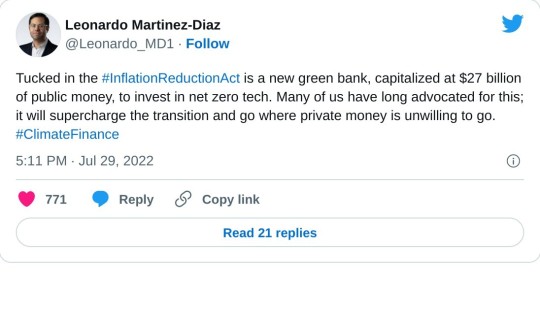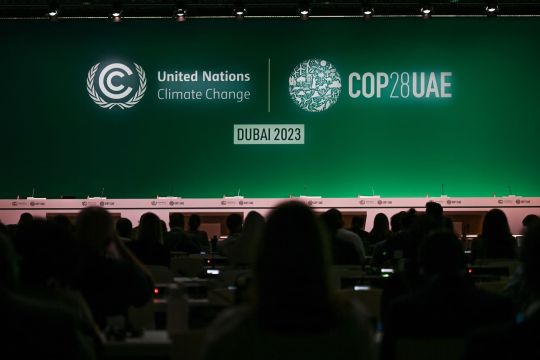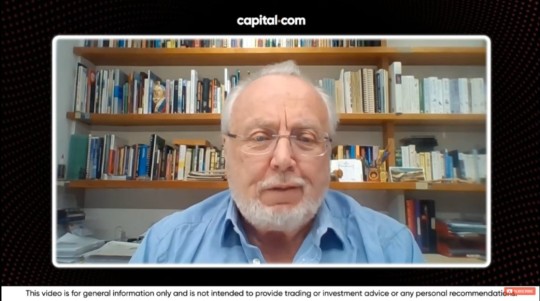#climate finance
Link
Since the Paris Agreement was signed in 2015, the six largest US banks – Chase, Citi, Wells Fargo, Bank of America, Morgan Stanley and Goldman Sachs – have provided $1.4 trillion in financing to the fossil fuel industry.
459 notes
·
View notes
Text
By Olivia Rosane
Common Dreams
Dec. 19, 2023
"This COP has once again proven that the COP processes are not working in our favor," the climate activist said.
Swedish climate activist Greta Thunberg called the outcome of the 28th United Change Climate Conference—which agreed to "transitioning away from fossil fuels" but stopped short of the phaseout demanded by civil society and climate-vulnerable nations—a "betrayal and a stab in the back."
COP28 concluded in the United Arab Emirates on December 13. The outcome, also called the "UAE Consensus," marks the first time that fossil fuels have made it into the final text to emerge from a U.N. climate summit. While some are celebrating this milestone, Thunberg was not impressed.
"The final outcome of COP28 is not a 'historic win,'" she wrote on social media Friday. "It is yet another example of extremely vague and watered down texts full of loopholes that in no way is even close to being sufficient for staying within the 1.5°C limit and ensur[ing] climate justice."

Speaking to Reuters at a protest outside the Swedish parliament on Friday, Thunberg said the agreement was the "bare minimum" and rejected the idea that it was a "first step."
"We've already had first steps and they haven't led us anywhere," Thunberg said. "The emissions are still increasing. We are experiencing record highs."
She also questioned the validity of U.N. climate negotiations.
"This COP has once again proven that the COP processes are not working in our favor," she told Reuters. "They are not designed to solve the climate crisis. They are more working as an alibi for world leaders" to hide behind their signature on a document while continuing to do nothing.
"We need drastic immediate emission cuts and binding commitments from the largest contributors of the climate crisis to finance loss and damages, adaptation, and a just transition in the most affected areas."
Thunberg's remarks build on her criticism of COPs in recent years. She stopped attending the gatherings beginning with last year's COP27 in Sharm El Sheikh, Egypt, which she called an opportunity for "greenwashing, lying, and cheating," according to Euronews Green.
This year, she particularly criticized the fact that members of small island states were not in the room when the final deal was adopted.
Thunberg said this was "undemocratic" and "completely unacceptable."
"We cannot talk about climate justice when without having the most affected in the room," she told Reuters.
On her Friday social media thread, Thunberg outlined what she thought successful climate action would look like.
"We need drastic immediate emission cuts and binding commitments from the largest contributors of the climate crisis to finance loss and damages, adaptation, and a just transition in the most affected areas," she said.
Thunberg's remarks add to those of many other climate activists and scientists who have criticized the deal for falling short of ensuring the 1.5°C target, inadequately funding the renewable energy transition in the Global South, and allowing dangerous loopholes such as carbon capture and storage technology promoted by the fossil fuel industry as a way to keep pumping while promising to "abate" their emissions.
"Although the text mentions a transition away from fossil fuel energy systems in a just and equitable manner, the text is full of loopholes and false solutions on unproven and expensive technology like nuclear, abatement, carbon capture and storage, transitional fuels, etc.," Philippines climate activist Mitzi Jonelle Tan said, as Euronews Green reported.
The group Scientist Rebellion put out a statement Friday calling for a global movement to keep fossil fuels in the ground.

"The United Nations climate summit, hijacked by the fossil fuel cartel, has gifted a blank check to rich countries and Big Oil to kill one billion people and force billions more to flee their homes by 2100," the group wrote. "The so-called 'historic' outcome of COP28 fails to deliver the most basic and necessary measures which would have prevented societal and 'Earth systems' collapse, as outlined by the IPCC: eliminate fossil fuel subsidies and halt all new gas and oil projects."
Their statement concluded: "It is time to listen to the scientists, hundreds of whom have been driven out of their labs and into the streets to engage in civil disobedience: If we want to avoid condemning both this generation and all that follow to the worst outcomes of the climate crisis, we must all rise together in order to keep fossil fuels in the ground. The time is now."
Our work is licensed under Creative Commons (CC BY-NC-ND 3.0). Feel free to republish and share widely.
#cop28#fossil fuels#carbon capture and storage#greta thunberg#climate crisis#climate emergency#climate finance#climate justice#scientist rebellion
28 notes
·
View notes
Text
Excerpt from this story from the New York Times:
For the past two years, world leaders, economists and activists have called for sweeping overhauls to the World Bank and the International Monetary Fund that would make the two lending institutions more adept at combating climate change.
Discussions about how to reform lumbering multilateral bureaucracies can get tedious quickly. But ultimately the debates are all about money. How to make more money available for developing nations that are being battered by extreme weather? And how to make sure poor countries don’t spend too much money servicing their debt?
Experts estimate that at least $1 trillion a year is needed to help developing countries adapt to hotter temperatures and rising seas, build out clean energy projects and cope with climate disasters.
“For many countries, they will only be able to implement strong new climate plans if we see a quantum leap in climate finance this year,” Simon Stiell, the United Nations climate chief, said in a speech last week.
Starting in 2022, a burst of activity had made the prospect of such a quantum leap seem within reach.
Policymakers and economists gathered in Barbados and hashed out an ambitious reform agenda. The president of the World Bank stepped down after coming under fire for not doing enough to address climate change, and was replaced by an executive who promised to embrace climate work. Emmanuel Macron, the president of France, hosted a summit aimed at building momentum for the work.
But at the annual spring meetings of the World Bank and the I.M.F., which are taking place in Washington this week, reality is setting in.
While more money has become available to address climate issues over the last year or so, the sweeping reforms many had envisioned are proving to be out of reach.
Some of that is a process problem. Overhauling 80-year-old international institutions with complicated governance structures and tens of thousands of employees is no small task.
But much of the challenge comes back to money. So far, the countries that control the World Bank — including the United States, Germany, China and Japan — have not allocated huge new sums for climate issues in the developing world, and the private sector has not stepped in to fill the gap.
“The numbers do not show the kind of progress that we really need,” said Rachel Kyte, a visiting professor at Oxford and former World Bank executive. “We’ve got to get a little bit more radical.”
6 notes
·
View notes
Text
Finanza climatica

Come trovare fondi da investire nella transizione? Soprattutto per quei Paesi che più hanno bisogno di risorse e che subiscono maggiormente gli effetti non solo del cambiamento climatico, ma anche di un sistema socioeconomico profondamente iniquo. Insomma, oserei dire che è una questione di equità e giustizia. Una definizione di “finanza climatica” è ardua, con i Paesi in via di sviluppo che premono per stabilire linee guida chiare su cui basare i contributi finanziari, e i Paesi sviluppati che preferirebbero ovviamente mantenere l’ambiguità attuale.
Ma dal nostro piccolo blog potremmo suggerire soluzioni come, ad esempio, incrementare i finanziamenti pubblici facendo pagare i responsabili della gran parte delle emissioni.
Altri soluzioni potrebbero essere: una tassa sui profitti record delle aziende fossili, l’abbandono delle sovvenzioni ai combustibili fossili, una tassa sui maxi-redditi (il 10% più ricco della popolazione mondiale è responsabile del 50% delle emissioni).
Così, giusto per fare qualche esempio che gira nell’aria.
#sostenibilità#ambiente#climate change#cambiamenti climatici#crisi climatica#finanza climatica#extra profitti#finanziamenti pubblici#ricchezza#climate finance
2 notes
·
View notes
Photo

Taking Action for a Sustainable Future: A Global Stocktake "Must Be the Tipping Point" to Limit Global Warming" TO learn more: https://blog.geohoney.com/tipping-point-towards-limiting-global-warming
#climate change#cop28#climate finance#capacity building#green technology#technology transfer#capacity#ipcc#global warming#stock takes#Geohoney
9 notes
·
View notes
Text
Lee White, Gabon’s environment minister, said: “The climate crisis is such that every country has to contribute to the solution. Gabon is 88% covered by tropical rainforest. We have maintained deforestation below 0.1% over 5 decades and net absorb over 100m tonnes of CO2 annually. Few countries are doing more for the planet. Developed nations, particularly the UK, which was at the origin of the Industrial Revolution, have to do the heavy lifting – but all too often they make false promises and fail to provide true leadership or even honour their modest financial commitments.“
3 notes
·
View notes
Quote
Most current climate funding promises to cover things to help ease or adapt to climate change (mitigation and adaptation), but not loss and damage. Without specific new funding for loss and damage, people who are already suffering will suffer more. Inequality will worsen worldwide, as loss and damage risks a range of impacts, like: fuelling debt, mass migration, and political instability or war. Setting up a loss and damage fund under the UN is the fairest, most transparent and accountable way to give financial support to countries and communities that urgently need it. Countries agreed to creating a fund in November 2022. What matters now is actually making sure developed countries commit new funds to go into the pot. And deliver on all their promises for climate finance.
‘Loss and damage: who foots the bill for climate destruction?’, Greenpeace
#Greenpeace#Loss#damage#climate funding#climate change#Inequality#climate impacts#loss and damage fund#UN#developed countries#climate finance
2 notes
·
View notes
Text

View on Twitter
Tucked in the Inflation Reduction Act is a new green bank, capitalized at $27 billion of public money, to invest in net zero tech. Many of us have long advocated for this; it will supercharge the transition and go where private money is unwilling to go.
(Source)
2 notes
·
View notes
Text
Operationalize the loss and damage fund to help compensate vulnerable nations for the impact of climate change.
This week, the 7th edition of the UNFF Clearing House on Forest Financing Quarterly Highlight newsletter was released. The newsletter provides a space to share information about recent developments, upcoming opportunities, learning materials, and other updates related to financing for forests.
The current edition highlights key developments at the UNFCCC COP28 the implications they have for forest financing. Climate finance discussions were a major highlight in Dubai with the agreement to operationalize the loss and damage fund to help compensate vulnerable nations for the impact of climate change. In addition, the global stocktake emphasized the current gap in climate finance and the importance of reforming the multilateral financial architecture and accelerating establishment of new and innovative sources of finance. Amongst the many announcements and pledges at COP 28, Brazil proposed the creation of the Tropical Forests Forever fund with an initial fundraising target of USD 250 billion and The World Bank announced a roadmap for growth of high-integrity carbon markets, including a target to produce up to 126 million forestry credits by 2028 through the Forest Carbon Partnership Facility.
#Forest Carbon Partnership Facility#UNFF#Climate finance#Global forest goals#gap in climate finance#forest financing quarterly
0 notes
Text

This infographic, produced for the Climate Markets and Investment Association (CMIA), unpacks the key systemic barriers and incentives to private finance access that can unleash the needed investment in climate adaptation.
#infographics#sustainability#infographic#climate change#energy#climatechange#markets#finance#climate finance#adaptation
1 note
·
View note
Text
COP28 climate summit signals the end of fossil fuels — but is it enough?
Scientists have voiced mixed reactions to a pledge to “transition away from fossil fuels” made by the world’s governments at the end of the COP28 climate summit in Dubai.
“It’s major,” says Lisa Schipper a developmental geographer at the University of Bonn, Germany.
Previous end-of-COP declarations have failed to mention fossil fuels in this way — at COP26 in Glasgow, delegates pledged to “phase…

View On WordPress
0 notes
Text
Is the transition to Net Zero actually achievable? - Capital.com
Is the #energytransition to #NetZero actually achievable? We already have the technology we need. We don’t have a technology problem. Can we deploy that technology fast enough? I think that is a much more difficult question. @e3g @capitalcom #renewables
Is it achievable technologically? Yes. We already have the technology we need to get to Net Zero, and there is a lot more to come. There is a lot of research going on that has been triggered by the challenge of reaching net zero. So, we are going to have the technology we need. We don’t have a technology problem. Can we deploy that technology fast enough? I think that is a much more difficult…

View On WordPress
#Capital.com#carbon#clean energy#clean tech#climate action#climate change#climate finance#climate transition#decarbonisation#E3G#emissions#energy#energy bills#energy efficiency#energy finance#energy market#energy policy#energy prices#energy transition#finance#green finance#green growth#green transition#investment#net zero#nuclear#policy#politics#renewable energy#Renewables
0 notes
Text
Watch "What's Wrong with Yuval Noah Harari's Climate and Cost Analysis?" on YouTube
youtube
#climate and environment#climate finance#climate action#climate scam#very well educated stupid people#smart stupidity!#climate crony capitalism#useful idiots#climate quizlings#Youtube
0 notes
Video
youtube
Fossil Fuel Fascists / This Frontier Needs Heroes
#youtube#climate and environment#climate change#climate crisis#climate activism#climate action#climate#climate finance
0 notes
Text
“About $2tn (£1.75tn) will be needed each year by 2030 to help developing countries cut their greenhouse gas emissions … And funds could be guaranteed on a sustained basis if the world’s richest countries agreed to share the burden fairly, based on their capacity to pay. While this is a proven model, used in 1966 in an attempt to eliminate smallpox, today only $7bn of UN financing (for peacekeeping) and just $1bn of health financing (to pay 25% of the current World Health Organization budget) is currently raised through a burden-sharing formula. All the rest comes through passing around a begging bowl. A world addressing an existential challenge should not have to rely on charity.”
6 notes
·
View notes
Text
Let’s eradicate poverty
Become a space Fairing civilisation
 create a sustainable planet
Become a multi planetary species
 Rely on renewable energy and not fossil fuels 
#space#spacex#multiplanetaryspecies#renewable energy#climate solutions#climate news#climate finance#tesla#neuralink#boring company#nasa#blue origin#spaceflight
0 notes